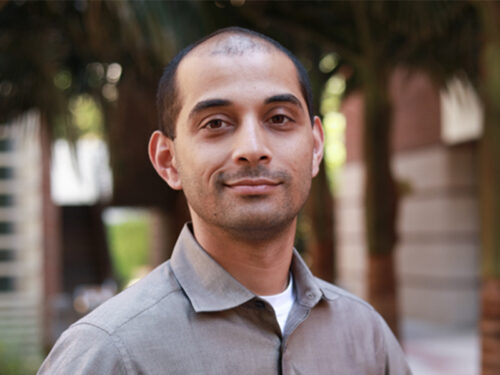
Date: November 8, 2023
Time: 12:30 p.m. - 1:30 p.m.
Location: Maeder Hall Auditorium
Equatic: The development of a seawater-based atmospheric carbon removal and hydrogen co-production platform
Gaurav Sant
Pritzker Professor of Sustainability and Henry Samueli Fellow, UCLA Henry Samueli School of Engineering and Applied Science Director of the Institute for Carbon Management
Abstract:
The trapping of carbon dioxide (CO2) as an aqueous (bi)carbonate ion (e.g., HCO3–, CO32–) or as a mineral solid is attractive because of favorable thermodynamics, and the durability and permanence of storage. Herein, I will describe an approach to rapidly precipitate Ca- and Mg- carbonates and hydroxides from seawater to achieve large-scale, cost-effective CO2 removal. This Equatic process electrolytically forces mineral carbonate precipitation – from seawater – thereby consuming CO2 that is dissolved in seawater by locking it within carbonate minerals, and simultaneously producing alkaline mineral hydroxides that when dissolved in seawater enable the drawdown of atmospheric CO2. This is because when dissolved into seawater, every mol of Mg(OH)2 leads to the absorption of up to ~1.7 mol of CO2. In addition, I will describe the translational design, fabrication, commissioning and operations of pilot plants in Singapore and Los Angeles which demonstrate a net energy intensity (NEI) of ~1-to-1.5 MWh per tonne of atmospheric CO2 removal.
Bio:
Since 2018, Sant has led the UCLA Institute for Carbon Management’s cross-disciplinary teams to create sustainable solutions for carbon removal. In April 2021, he led the UCLA CarbonBuilt team, which developed a new technology that turns carbon dioxide into concrete, to win the $7.5 million grand prize in the COSIA Carbon XPRIZE competition, making UCLA the first university to win an XPRIZE. The institute’s ongoing projects include SeaChange, an energy-efficient technology that removes carbon dioxide dissolved in seawater; x/44, a method for achieving electrochemical direct air capture; and EPOCH, an electrochemical process for producing portlandite — a limestone and cement replacement — designed to greatly reduce the carbon dioxide emissions associated with cement and concrete production. Technologies developed at the institute are being commercialized by UCLA startup companies including CarbonBuilt, Concrete-AI, and Equatic.
Sant received a Ph.D., M.S. and B.S. in civil engineering from Purdue University. He joined the UCLA faculty in 2010 and is the principal investigator in the Laboratory for the Chemistry of Construction Materials. His research interests include cementitious materials and porous media, with a focus on their chemistry-microstructure-engineering properties, reducing the carbon footprint of construction materials and other related topics.
In addition to his groundbreaking research, Sant has published more than 100 peer-reviewed scientific publications and his work has been supported by federal and state agencies, foundations and Fortune 500 corporations. He has received numerous awards from the National Science Foundation, American Concrete Institute, American Institute for Chemical Engineering, and International Union of Laboratories and Experts in Construction Materials, Systems and Structures.
All seminars are held from 12:30 p.m. to 1:30 p.m.
Lunch is provided at 12:00 noon.
Visit acee.princeton.edu/highlight-seminar-series for more info.